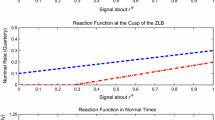Abstract.
This paper analyses the effect of measurement error in the output gap on efficient monetary policy rules in a simple estimated model of the US economy. While it is a well-known result that such additive uncertainty does not affect the optimal feedback rule in a linear-quadratic framework, it is shown that output gap uncertainty can have a significant effect on the efficient response coefficients in restricted instrument rules such as the popular Taylor rule. Output gap uncertainty reduces the response to the current estimated output gap relative to current inflation and may partly explain why the parameters in estimated Taylor rules are often much less than what optimal control exercises which assume the state of the economy is known suggest.
Similar content being viewed by others
Author information
Authors and Affiliations
Additional information
First version received: September 2000/Final version received: February 2001
Rights and permissions
About this article
Cite this article
Smets, F. Output gap uncertainty: Does it matter for the Taylor rule?. Empirical Economics 27, 113–129 (2002). https://doi.org/10.1007/s181-002-8362-4
Issue Date:
DOI: https://doi.org/10.1007/s181-002-8362-4




